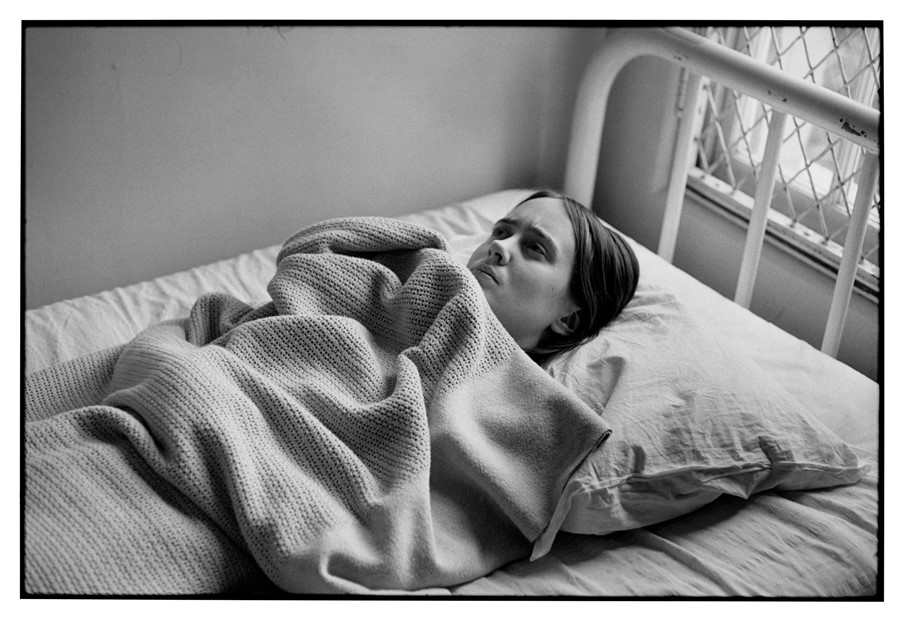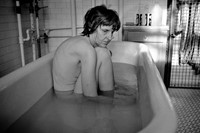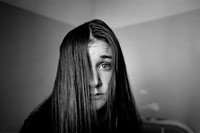A new book by Mary Ellen Mark and Karen Folger Jacobs compiles photographs and interviews from 1976 with patients at Oregon State Hospital’s Ward 81. Here, Jacobs talks about the project’s illuminating legacy
In the spring of 1976, photographer Mary Ellen Mark and her friend Karen Folger Jacobs, a writer and mental health professional, embarked on a trip to a women’s mental institution: Oregon State Hospital’s Ward 81. There they stayed for the duration of a month, photographing and interviewing the women confined within its walls. Often pushed to the margins of society and dismissed as dangerous, the patients of Ward 81 responded with delight to the interest from these visitors. Under the squalid living conditions and barbaric mental health treatments at the state hospital, these women were unaccustomed to the kindness and respect Mark and Jacobs approached them with throughout their project.
Mark’s photos, which have been compiled in a new book, Ward 81: Voices, flit between capturing deeply tender and jarringly raw moments, showing a vulnerability in her subjects that humanise them. Patients are caught with a sometimes surprising levity: striking a silly pose under harsh fluorescent lighting, doing yoga on the sanitarium’s sterile linoleum floors, watching Elvis Presley, starry-eyed, on a television screen. Portrait-style shots depict some of the Ward 81 women standing proudly in their stark surroundings: by a bath, next to a bed strewn with a few belongings, wrists strapped in the middle of an empty room. While Mark’s images reveal relatable qualities in her subjects (a sense of romance, for instance, as two women hug in a corner) some photographs reveal the undoubtedly disturbing truths of mental institutions, capturing electroshock therapy treatments and the cold loneliness of isolated living.
The book depicts a nuanced perspective on mental health in a moving exchange between Jacobs and a Ward 81 patient named Beth. “Beth, how do you feel?” Jacobs asks. In response, she says, “If I didn’t keep hearing all these voices talking to me all the time, things would be a lot better.” When asked about what the voices say, Beth’s response is so earnest and candid, it’s almost jarring: “Oh, they tell me I should break up with Mona and all kinds of things, but I don’t listen to ‘em.”
Nearly 50 years after the project, Karen Folger Jacobs reflects on Ward 81: Voices:
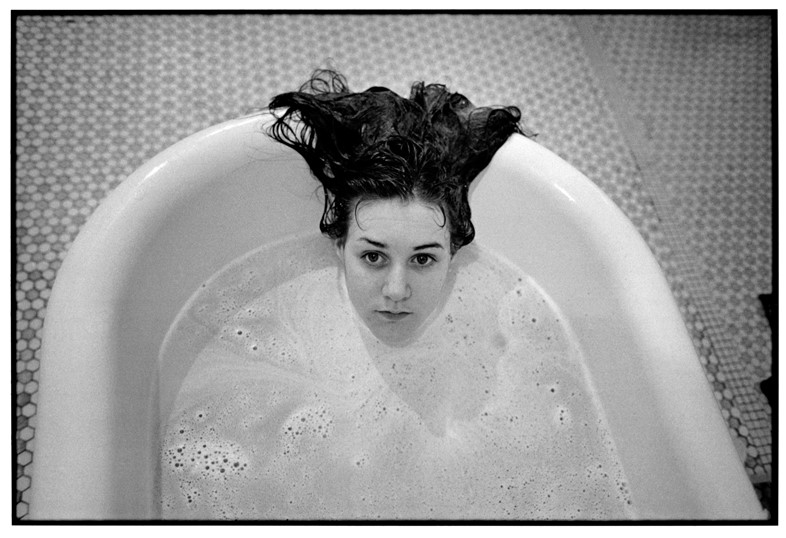
“Mary Ellen and I grew up in the suburbs of Philadelphia and went to the same high school. We were people who really wanted to see wider horizons. We wanted to get out of our small suburb, and we both wanted to get out in the world. She ended up in New York and I ended up in California. So we wanted to do a project together, and she said that while she was working on One Flew Over the Cuckoo’s Nest, she had gotten to see the locked ward for women – Ward 81. I have a background in mental health and I’m licensed as a therapist in California, so we made plans to go there. My feeling was that this was going to be emotionally taxing for us. We were going to be with women who had been locked up, some for years, and we were not going to be able to do anything to release them.
“We agreed that we would not interfere with the treatment of the people, we would not argue with the patients and we would not argue with any of the staff, despite any feelings we had about them. We would just be open to the patients, and get to know them and their culture. Mary Ellen and I had to be a team. We had to approach this together, and we never had any arguments or disagreements. There were times when we felt really angry about something that happened, or at some staff people, but we had each other.
“What we were trying to do was demonstrate life there. It was kind of an ethnography because we were trying to demonstrate a different culture, which she and I had already been doing in our work: going to other cultures and societies. It was very stressful, but one of the things I insisted on is that every night, Mary Ellen and I would talk about what happened. What we thought about it, what we did right or wrong, what she would do the next day. And during the day, I used my tape recorder to record the patients. They liked being able to talk, and having someone to listen. Often, they would just take the tape recorder and talk to it themselves.
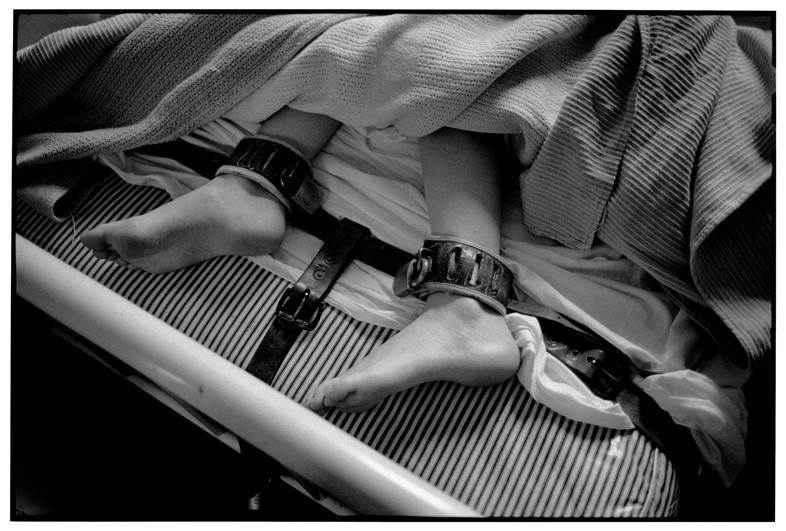
“In the 70s, we had deinstitutionalisation, and most people were discharged from mental hospitals. This was Jimmy Carter’s thing, and I was on the presidential commission for mental health advising them about women. The Carter administration put these people out of the hospitals and the plan was to have community support and mental health, but the fact is, it didn’t get funded, so it didn’t happen. All these people get turned out in the street, and what happens? Nothing good. Where are they living? In a cardboard box, in a tent, on a corner, in a street in a big city. It’s terrible for these people, but they are products of our society. The book was written about people in 1976 and our world is very different now. Our world has, believe it or not, more stresses on people, particularly young people.
“You and I may still have doubts and worries and problems, but these people mostly came from really disrupted families. Many of them were abused in various ways. What we need for mental health is not only focus on treating the people, but focus on what’s causing it. Why are these people so upset? How can we make living more generous, more bountiful, make people happier, enable people to have better lives?
“I insisted that we not see the patients’ records, what they allegedly had done, any psychiatrists’ evaluation. We didn’t want to see what anybody was accused of, because these people were all put in by a judge who had determined that they were a danger to themselves or others. I wanted us to treat these people as people and be friends with them. To be honest, I think they were thrilled to have someone who was interested in them. The staff were just obligated to do these tasks, give them medicine, serve meals, et cetera … Mary Ellen and I didn’t have tasks except to hang out with the patients all day.
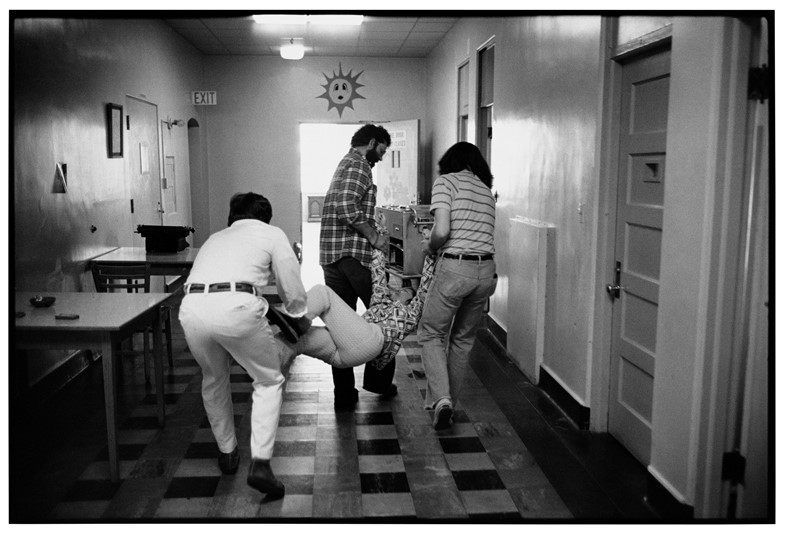
“Every morning I would go out and run a few miles, just to de-stress. I would see all these flowers and stuff, it was spring. One time, coming back, I saw a Camellia bush. I started taking some for Mary Ellen, and then I thought, ‘oh no, I’m taking them for who really needs them.’ I brought the flowers upstairs and gave one to every patient. And one said, ‘this is the nicest thing that has ever happened to me in this hospital.’ Nobody did anything special for them. They didn’t have choices. They were deprived of a lot of things that we think of as normal.
“We felt really sad to be leaving them. They didn’t want us to – they kept telling us, ‘don’t go, we want you here.’ But we knew when we came that we were going to stay about a month. We didn’t feel that this treatment – being locked up, electroshock therapy – was very healthy for people. But our intent there was not to make an evaluation. Our intent was to be a pair of anthropologists. We were documenting a culture. We were seeing what was going on in a locked ward people couldn’t visit.
“I’m very glad that we were allowed to come and do this project. I feel incredibly privileged not to be in a hospital like this. I got this newfound gratitude for life from there and I still have it. I can choose things, I can go to the store and get clothes, get food I want, talk to people, have contact with anybody I want. It’s a gift. I have freedom in a way that these people didn’t have, and most people aren’t aware of other people without freedom. Mary Ellen and I appreciated the choices that we have, and the thing about when you’re in one of these institutions, you don’t have choices about stuff. We both said to each other that the Ward 81 project was perhaps the most important thing in our lives. And it still keeps impacting us. It’s been almost 50 years.”
Ward 81: Voices by Mary Ellen Mark and Karen Folger Jacobs is published by Steidl and is out now.
